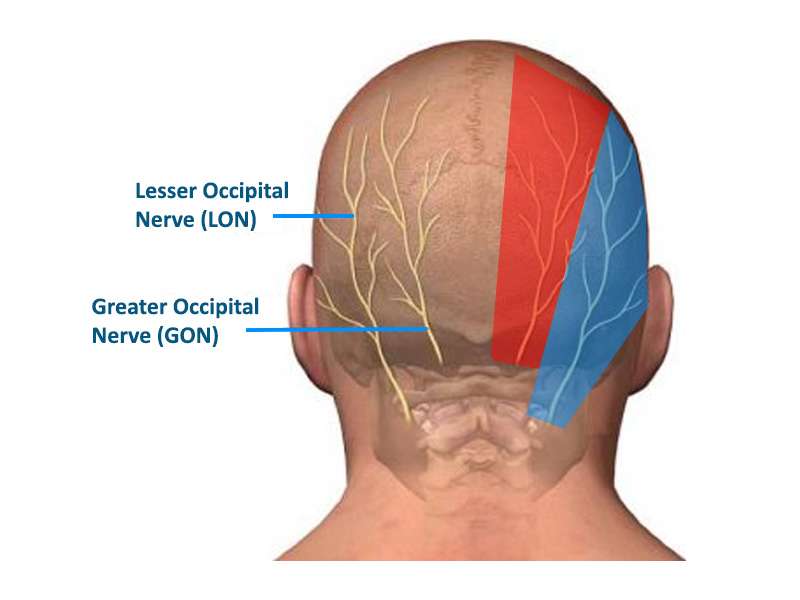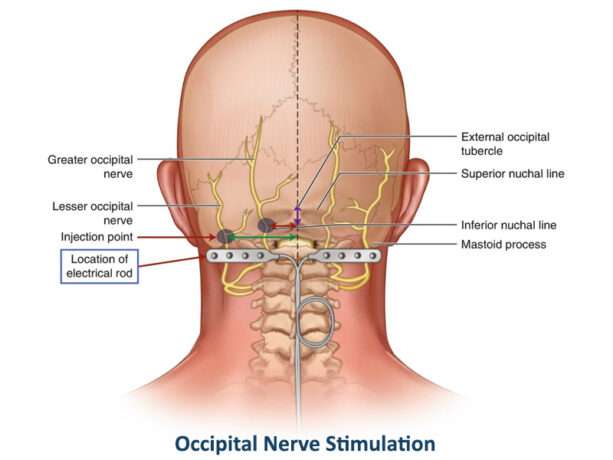Occipital neuralgia is a type of headache that causes intense pain in the back of the head, scalp, and neck. It is caused by irritation or injury to the occipital nerves, which run from the top of the spinal cord to the scalp. Occipital neuralgia can be a challenging diagnosis to make, as its symptoms can overlap with other common pain syndromes. In this article, we will discuss the symptoms, causes, diagnosis, and treatment options for occipital neuralgia.

In typical cases of occipital neuralgia, the most common symptoms of the patient may be the following:
Headache: The most common and prominent symptom of occipital neuralgia is severe, throbbing pain in the back of the head. This pain can come and go or last for a while. The patient may complain of numbness or tingling in that area. Sometimes, certain movements or pressure on the neck can trigger this pain, and dizziness can accompany these symptoms.
Sensitivity to Touch: The scalp can become hypersensitive to touch. Even light activities such as combing hair or putting the head on a pillow can cause pain.
Eye Pain: This pain can radiate into the eyes and can feel like a headache behind the eyes. Blurred vision, light sensitivity and other vision problems may also occur.
There are various causes of irritation or damage to the greater and lesser occipital nerves that are considered to be the underlying etiology of occipital neuralgia. Understanding these causes is important in order to manage the condition effectively. Damage to the nerves can be caused by:
Nerve Compression: Occipital nerves can become compressed or trapped by surrounding tissues or muscles. This compression is a common cause of the condition.
Trauma: Head and neck injuries, such as whiplash from car accidents or falls, can damage the occipital nerves, leading to occipital neuralgia.
Tight Muscles: Chronic muscle tension and spasms in the neck and upper back can irritate the occipital nerves.
Medical Conditions: Certain medical conditions like infection, osteoarthritis, diabetes, or gout may increase the risk of occipital neuralgia.
The symptoms of occipital neuralgia are in some cases similar to those of tension-type headaches and migraines. It can therefore often be misdiagnosed. To correctly diagnose occipital neuralgia, the doctor takes a thorough history and performs a physical examination. Special imaging procedures such as X-rays, computed tomography (CT) or magnetic resonance imaging (MRI) may be ordered to exclude any underlying pathology. When occipital neuralgia is suspected, a diagnostic occipital nerve block may be performed. If pain relief is reported after the nerve block is performed, then the diagnosis of occipital neuralgia is confirmed.
Managing occipital neuralgia often involves a combination of medical and lifestyle interventions:
Physical therapy: stretching and strengthening exercises, hot or cold packs applied to the site of pain usually help patients.
Medication: anti-inflammatory drugs, muscle relaxants, anticonvulsants are prescribed by the doctor if necessary.
Percutaneous nerve blocks: blocks of nerves such as GON and LON, performed by experienced pain specialists, can be used to both diagnose and treat occipital neuralgia
Botulinum toxin (Botox) injections: some studies have reported that Botox injections reduce the pain of occipital neuralgia.
Occipital Nerve Stimulation: this surgical treatment involves placing electrodes under the skin near the occipital nerves. The method works in the same way as spinal cord stimulation and uses the same device. The procedure is minimally invasive and the surrounding nerves and structures are not damaged by the stimulation.

Spinal Cord Stimulation (DCS): this surgical treatment involves placing stimulating electrodes between the spinal cord and vertebrae. The device generates electrical impulses to block pain messages from the spinal cord to the brain
C2,3 Ganglionectomy: this treatment involves disruption of the second and third cervical sensory dorsal root ganglion.
Lifestyle Modifications: Stress reduction techniques, regular exercise, and maintaining good posture can contribute to symptom management.
Occipital neuralgia can be a challenging condition to manage, but with the right diagnosis and treatment plan, individuals can find relief from the debilitating symptoms. If you suspect you are suffering from occipital neuralgia, it is essential to consult a healthcare professional to discuss your symptoms and explore the most suitable treatment options for your specific case. Effective management can significantly improve your quality of life and help you regain control over your well-being.